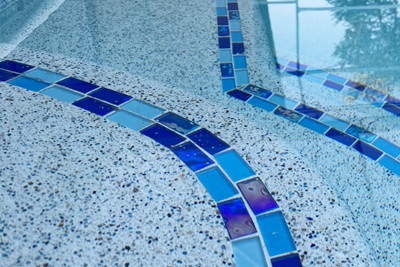Revitalize Your Pool: Why Updating Tiles and Resurfacing is a Must
Mon, Dec 23rd, 2024
A swimming pool isn’t just a luxury; it’s an integral part of your home’s outdoor space. Over time, however, even the most stunning pools begin to show signs of wear and tear.
Whether it’s dingy tiles that refuse to shine despite pressure cleaning or a surface that feels rough underfoot, maintaining your pool’s aesthetics and functionality is crucial for both enjoyment and safety.
Here’s why updating your pool tiles and resurfacing are worthwhile investments in keeping your pool in pristine condition.
The Problem with Dingy Pool Tiles
Pool tiles are designed to enhance the beauty of your pool while protecting it from water damage. However, over time, exposure to chemicals, minerals in water, and constant sun can dull and discolor even the best-quality tiles. While pressure cleaning can remove surface grime, it won’t restore tiles that are:
- Permanently stained: Hard water stains and chemical buildup often leave stubborn marks that pressure washing can’t erase
- Cracked or chipped: Damaged tiles are not just unsightly but can also pose safety risks
- Outdated: Even if your tiles are clean and intact, outdated styles can detract from your pool’s overall appearance
Updating your pool tiles doesn’t just improve aesthetics; it’s also an opportunity to modernize your pool with trendy designs, color schemes, or mosaic accents that reflect your personal style. New tiles also increase the durability of your pool by providing a fresh layer of protection against wear and tear.
The Importance of Resurfacing
Resurfacing the interior of your pool is another key aspect of long-term maintenance. Additionally, draining and cleaning your pool should be done every 3 to 5 years to remove built-up debris and minerals, ensuring optimal water quality and a pristine appearance. Over time, the surface of your pool—whether it’s made of plaster, pebble, or concrete—will degrade due to regular use, exposure to chemicals, and natural aging.
How Often Should a Pool Be Resurfaced?
Most pools require resurfacing every 7 to 10 years, depending on factors like the material used and the level of maintenance. Here’s a quick guide:
- Plaster pools: Typically need resurfacing every 7 to 10 years
- Pebble pools: Generally last 10 to 15 years before needing attention
- Concrete pools: Require resurfacing every 10 to 15 years, depending on upkeep
Signs Your Pool Needs Resurfacing
- Rough texture: If the surface feels abrasive to the touch or underfoot, it’s time for resurfacing
- Discoloration: Stains from algae, chemicals, or mineral buildup are indicators that resurfacing is overdue
- Leaks: Small cracks can allow water to seep out, leading to higher water bills and potential structural issues
- Peeling or flaking: This indicates delamination, a sign that the surface layer is deteriorating
Benefits of Pool Resurfacing
- Improved Safety: A smooth, well-maintained surface reduces the risk of cuts, scrapes, and slips
- Enhanced Durability: Resurfacing protects your pool structure, preventing costly repairs down the line
- Better Water Quality: A fresh surface makes it easier to maintain chemical balance and clean water
- Aesthetic Appeal: Resurfacing revitalizes your pool’s look, making it more inviting and increasing your property’s value
The Role of Regular Pool Maintenance
While updating tiles and resurfacing are periodic needs, regular pool maintenance ensures your pool stays in great shape between these larger projects. Proper upkeep also extends the life of your tiles and surface, delaying the need for replacement or repair. Key maintenance tasks include:
- Water Chemistry: Regularly check and balance pH, alkalinity, and chlorine levels to prevent staining, scaling, and algae growth
- Tile Cleaning: Use appropriate cleaners to remove dirt and mineral deposits before they become permanent stains
- Brushing and Skimming: Regularly brush the walls and skim the surface to remove debris and reduce buildup
- Filter Maintenance: Clean and replace filters as needed to ensure proper water circulation
- Seasonal Inspections: Have a professional check for signs of wear, cracks, or leaks annually
When to Call the Professionals
While some pool maintenance tasks can be DIY, resurfacing and tile replacement require professional expertise. A reputable pool service like Sweetwater Pool Service ensures:
- Quality Materials: Access to the best tile and resurfacing materials that stand the test of time
- Expert Installation: Proper techniques to ensure durability and a flawless finish
- Comprehensive Assessment: Professionals can identify underlying issues, such as structural cracks or plumbing leaks, that need to be addressed during the update
Make Your Pool Shine Again
A pool is a place for relaxation, fun, and making memories. Don’t let dingy tiles or a deteriorating surface detract from your enjoyment. Updating your tiles and resurfacing your pool not only restores its beauty but also enhances safety, functionality, and longevity.
At Sweetwater Pool Service, we specialize in transforming pools into pristine oases. Whether you need to replace outdated tiles, resurface your pool, or simply schedule regular maintenance, our team is here to help. Contact us today to learn how we can make your pool the sparkling centerpiece it deserves to be.



